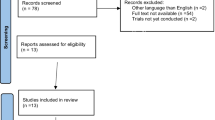Abstract
Background
Depression in breast cancer (BCa) patients can reduce quality of life, relationships and treatment compliance, thus constituting a major target for cognitive behavioural (CBT) interventions. Although CBT treatments, which are built upon consideration of the roles of antecedents and consequences for depressive behaviour, are effective, the nature of those antecedents which trigger depression among BCa patients has received relatively little attention.
Purpose
Hypotheses were (1) to determine if BCa patients were experiencing either or both of punishment type I and II and (2) to identify if these aspects of punishment were related to overall depression.
Method
Two hundred fifty-three BCa patients completed a standardised depression scale, and data were factor analysed. Components were interpreted for their relationship to punishment type I or II.
Results
Two major components emerged: (1) loss of previously available sources of personal or social reinforcement (i.e. punishment type II or negative punishment) and (2) behavioural, emotional and cognitive responses to those losses. These two components represent the total symptomatology of major depressive episode from DSM-IV-TR.
Conclusion
These findings support the application of a functional analytic model of depression within CBT assessment and treatment procedures with BCa patients.
Similar content being viewed by others
References
DeRubeis RJ, Hollon SD, Amsterdam JD, Shelton RC, Young PR, Salomon RM, et al. Cognitive therapy vs medications in the treatment of moderate to severe depression. Arch Gen Psychiatry. 2005;62:409–16.
O'Neill R, Horner R, Albin R, Sprague J, Storey K, Newton J. Functional assessment and program development for problem behavior: a practical handbook. Pacific Grove: Brooks/Cole; 1997.
Kohlenberg RJ, Tsai M. Functional analytic psychotherapy: creating intense and curative therapeutic relationships. New York: Plenum Press; 1991.
Wade T, Lee C. The impact of breast cancer on the lives of middle-aged women: results from the Australian longitudinal study of women's health. Health Psychol. 2005;24:246–51.
APA. Diagnostic and statistical manual of mental disorders. 4th ed. Washington: American Psychiatric Association; 2000. Text Revision.
Love A, Grabsch B, Clarke D, Bloch S, Kissane D. Screening for depression in women with metastatic breast cancer: a comparison of the Beck depression inventory short form and the hospital anxiety and depression scale. Aust NZ J Psychiatry. 2004;38:526–31.
Colleoni M, Mandala M, Peruzzotti G, Robertson C, Bredart A, Goldhirsch A. Depression and degree of acceptance of adjuvant cytotoxic drugs. Lancet. 2000;356:1326–7.
Fallowfield L. Quality of life issues in relation to the aromatase inhibitor. J Steroid Biochem Mol Biol. 2007;106:168–72.
Day R. Quality of life and tamoxifen in a breast cancer prevention trial. Ann NY Acad Sci. 2001;949:143–50.
Somerset W, Stout S, Miller A, Musselman D. Breast cancer and depression. Oncology. 2004;18:1021–34.
Watson M, Haviland J, Greer S, Davidson J, Bliss J. Influence of psychological response on survival in breast cancer: a population-based cohort study. Lancet. 1999;354:1331–6.
Kissane D, Grabsch B, Love A, Clarke D, Bloch S, Smith G. Psychiatric disorder in women with early stage and advanced breast cancer. Aust NZ J Psychiatry. 2004;38:320–6.
Hersen M. Clinician's handbook of behavioral assessment. Amsterdam: Elsevier; 2006.
Sharpley C. Neurobiological pathways between chronic stress and depression. Clin Med: Psych. 2009;2:33–45.
Dougher MJ, Hackbert L. A behavior-analytic account of depression and a case report using acceptance-based procedures. Behav Anal. 1994;17(2):321–34.
Ferster CB. A functional analysis of depression. Am Psychol. 1973;28:857–70.
Kanter JW, Busch AM, Weeks CE, Landes SJ. The nature of clinical depression: symptoms, syndromes, and behavior analysis. Behav Anal. 2008;31(1):1–21.
Zung W. A self-rating depression scale. Arch Gen Psychiatry. 1965;12:63–70.
DeJonge J, Baneke J. The Zung self-rating depression scale: a replication study on reliability, validity and prediction. Psychol Rep. 1989;64:833–4.
Gabrys J, Peters K. Reliability, discriminant and predictive validity of the Zung self-rating depression scale. Psychol Rep. 1985;57:1091–6.
Sharpley CF, Christie DRH. ‘How I was then and how I am now’: current and retrospective self-reports of anxiety and depression in Australian women with breast cancer. Psycho-Oncol. 2007;16:752–62.
Schaefer A, Brown J, Watson C, Plenel D, DeMotts J, Howard M, et al. Comparison of the validities of the Beck, Zung and MMPI depression scales. J Consult Clin Psychol. 1985;53:415–8.
Zung W. From art to science: the diagnosis and treatment of depression. Arch Gen Psychiatry. 1973;29:328–37.
Tabachnick B, Fidell L. Using multivariate statistics. 4th ed. Boston: Allyn & Bacon; 2001.
Author information
Authors and Affiliations
Corresponding author
Rights and permissions
About this article
Cite this article
Sharpley, C.F., Bitsika, V. & Christie, D.R.H. Understanding the Functionality of Depression Among Australian Breast Cancer Patients: Implications for Cognitive and Behavioural Interventions. Int.J. Behav. Med. 18, 319–324 (2011). https://doi.org/10.1007/s12529-010-9098-5
Published:
Issue Date:
DOI: https://doi.org/10.1007/s12529-010-9098-5




